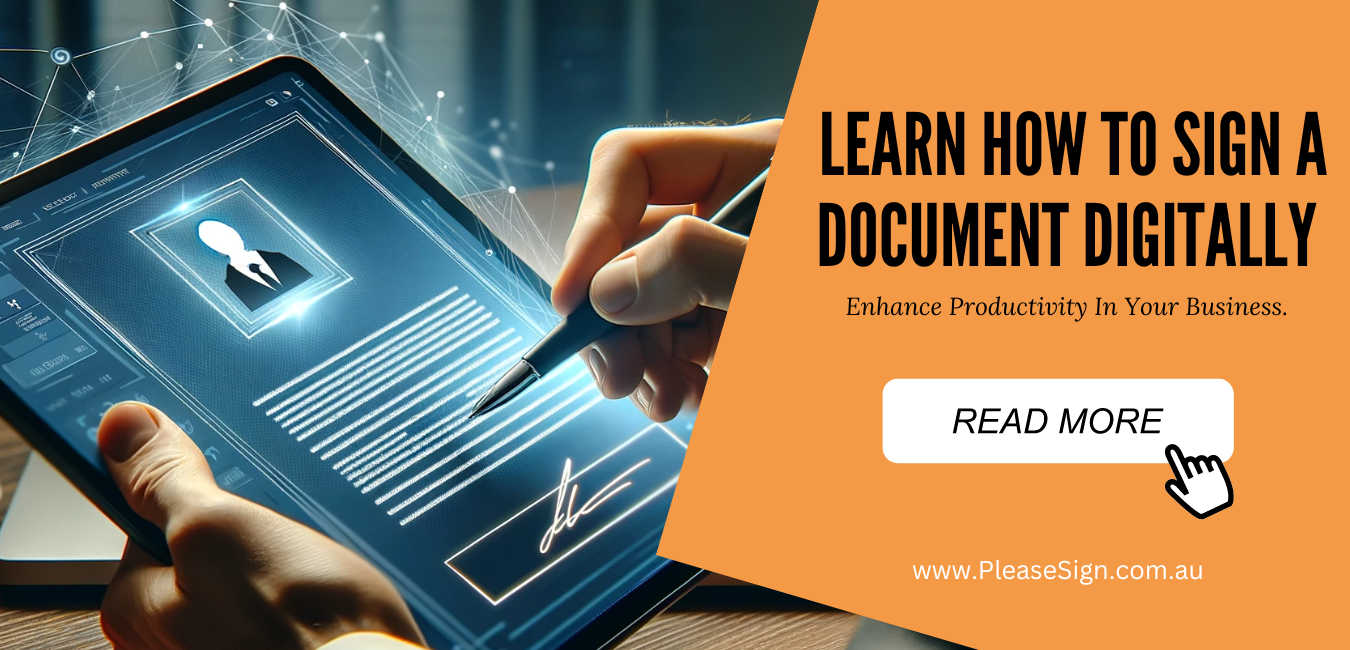
Learn How To Sign A Document Digitally And Enhance Productivity In Your Business
The ability to sign documents digitally has become a crucial skill in streamlining business operations and personal transactions. This detailed guide will explore the concept of digital signatures, focusing on how to sign a document digitally, particularly with the help of platforms like PleaseSign, which are reshaping document management by offering convenience, enhanced security, and improved efficiency.
Understanding Digital Signatures
Digital signatures are the electronic equivalent of traditional ink signatures, but with added layers of security and validation. They are used to authenticate the identity of the sender of a message or the signer of a document, ensuring that the original content of the document hasn’t been altered after it was signed.
The Evolution of Digital Signatures
Transitioning from pen-and-paper to digital signatures marks a notable progression in the realm of technology. This evolution is not just a trend but a necessary step towards more efficient, secure, and legally compliant document management in today’s digital landscape.
Step-by-Step Process of how to sign a document Digitally
- Selecting a Digital Signature Platform: Choose a platform like PleaseSign, known for its user-friendly and secure services.
- Uploading Documents: PleaseSign supports multiple formats, with a particular emphasis on PDFs for better compatibility and document integrity.
- Adding Recipients: If the document requires multiple signatures, you can easily add other signatories’ email addresses.
- Placing Your Signature: Use the platform to drag and drop your signature onto the document, or create a new one.
- Sending and Tracking: Keep track of the document’s signing process with real-time updates.
- Storing and Managing Documents: Securely store your signed documents on PleaseSign for easy future access.
Advanced Security Features of PleaseSign
PleaseSign enhances the security of digital signatures with features such as SMS signing links, unique security codes, two-factor authentication (2FA), and end-to-end encryption.
Sector-Specific Applications of Digital Signatures
- Healthcare: Digital signatures in healthcare improve confidentiality in patient records. For example, a healthcare provider can digitally sign and securely exchange sensitive patient consent forms or medical records.
- Real Estate: Real estate transactions benefit from the speed digital signatures offer. Real estate agents use PleaseSign to digitally sign and send lease agreements or sales contracts to clients, thus expediting property transactions.
- Education: In education, digital signatures simplify enrolment processes and academic records management. Educational institutions adopt PleaseSign for signing and managing student enrolment forms, consent documents, and staff contracts.
- Government: Government agencies leverage digital signatures for secure document handling, such as signing internal documents, policy updates, and public service agreements. This ensures a higher level of efficiency and security in public sector operations.
- Legal Sector: Law firms and legal departments use digital signatures for handling sensitive documents such as client agreements and legal documents, maintaining the integrity and confidentiality of legal proceedings.
- Finance: The finance sector utilises digital signatures for seamless banking operations, including loan applications and account openings. Banks and financial institutions benefit from the enhanced security and efficiency digital signatures provide.
- Manufacturing: Manufacturing companies use digital signatures to expedite the approval of design documents and contracts, thereby improving production timelines and product development processes.
- Retail and E-commerce: In retail, digital signatures streamline vendor agreements, purchase orders, and customer transactions, making the supply chain and sales processes more efficient.
Customer Feedback and Reviews
Customers appreciate PleaseSign for its user-friendly interface, cost-effectiveness, and efficient customer service. Read our Google reviews here.
Legal Compliance of Digital Signatures
Digital signatures are legally binding in many jurisdictions and are recognised under various laws globally, ensuring that digitally signed documents are as legitimate as their paper counterparts. Learn more about the legalities of digital signatures here.
Conclusion
Learning how to sign a document digitally, particularly through platforms like PleaseSign, is a strategic step towards modernising document management. It offers numerous advantages, including enhanced security, increased efficiency, and compliance with legal standards. Whether for business or personal use, understanding and utilising digital signatures is crucial in today’s digital-first world.
Experience the future of how to sign a document digitally with PleaseSign, and discover the myriad benefits digital signatures bring to various sectors and industries.
To discuss how PleaseSign will benefit your business speak to one of our Australian based support team members.



